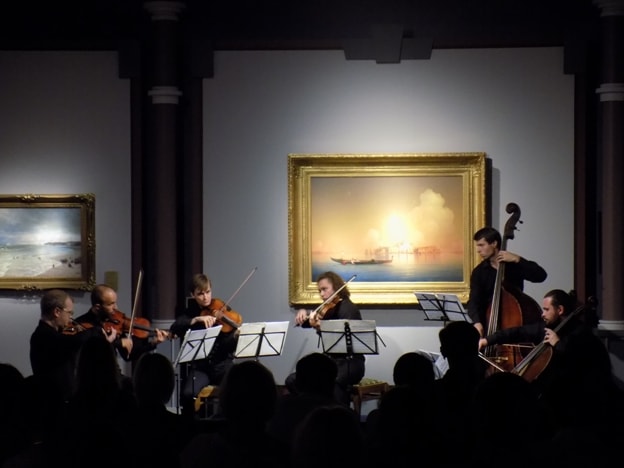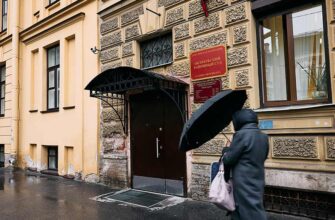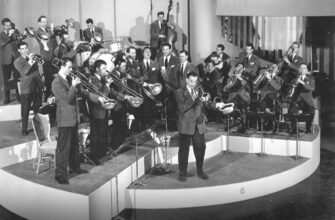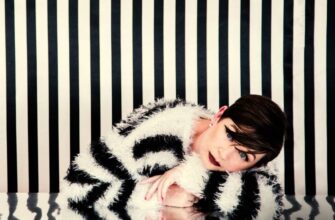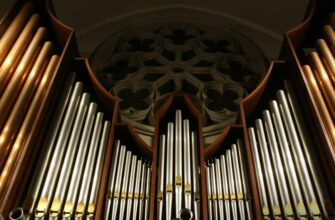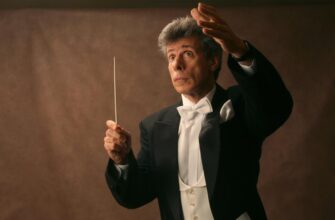On August 11 2016, an AlterEgo string band held a concert of the Viennese music from the series “Remembrance of Things Past “.
The performance hall was situated on the territory of Christ the Saviour Cathedral and its interior was exposing the works of I. K. Aivazovsky. The concert was happening in an intimate and comfortable atmosphere with fascinating explanations of the musical compositions the ensemble introduced to the audience. It included works by W. A. Mozart, R. Strauss, A. Schoenberg and J. Strauss.
We recommend you to pay attention to the program. We also put online an interview with the head of the band, a cellist Andrey Berezin. The next and last concert in the summer devoted to a cycle “Russia, XX century: Shostakovich” will take place at the “Art Center. Moscow” on August, 26.
EV: Andrew, thank you for agreeing to give us an interview. Please, tell me, it’s not your first concert under the summer program of “Art Center. Moscow”, is it?
Andrey Berezin: Yes, it is our fourth concert here. Initially, we imagined our participation in the program as an experiment: summer, off-season, it is difficult to assemble an audience. The idea was to do a long cycle, from J. S. Bach till our times, the twenty-first century. And the result is very nice, people have come, we enjoy playing for them, and I like the place and we get it right.
EV: Indeed, you get it right. You know, I was interested in the program. In this connection, how did you make such a selection, a presentation of the Viennese composers? A radiant Mozart, a romantic Richard Strauss, and “Doctor Faustus” as well…
Andrey Berezin: “Transfigured night” (A. Schoenberg) is something special for our band. Some time ago, we put up a ballet on this music. It was not a ballet in its usual sense, we were walking on the stage ourselves, playing the roles, interacting with the artists. Today, I’ve been approached by people who saw that performance. They got interested and came to the concert today.
As for today’s concert, we have also added Mozart and “The Knight of the Rose” to the program, the waltzes. This is because the name of the concert, “Gold of Vienna”, says about the city which is associated with a huge number of composers. It is a world center of classical music today. We tried to perform the music in a process, from Mozart. In particular, our audience does not know much Schoenberg…
EV: Indeed, Arnold Schoenberg’s rarely performed…The more, you have numbered him among the Viennese classics.
Andrey Berezin: Not classics, but the Viennese composers.
As for us all, highlighting the contemporaneity of music is a very important method of communication with the audience. I don’t like it, when music becomes a museum piece and becomes meaningless. It is important for both the musicians and the people who come to the concert, to were able to get through this experience internally. To understand how to communicate with this art, what it is for and why it is important to listen to this music now. We are constantly in search of format.
Together with our master Asya we made up a general outline and put it together in an interesting story. We try to captivate the viewer, to be with him and to avoid detachment.
EV: Tell me, please, your selection of composers, and in particular the inclusion of A. Schoenberg in this group, how does it describe the Viennese school? How much did he stick to its traditions? We are very interested in your professional opinion.
Andrey Berezin: This is a fairly complex musicological question. To me, honestly, the Vienna music history is strongly connected with the club of Alma Mahler, the wife of a composer Gustav Mahler. Also, she had several affairs with famous Viennese people. Schoenberg was one of the members of this club.
We want to show, that Vienna is a waltz, something festive, but this music is different. And, of course, Schoenberg is the Viennese composer for me.
EV: Do you like Schoenberg?
Andrey Berezin: I like Schoenberg. In addition, “Transfigured night” is not typical music of him. He invented the twelve-tone row, and his music has changed in eight years. But the number of our program is late-romantic music, a direct legacy of J. Brahms, R. Wagner. It was written in the last years of the nineteenth century.
I am quite familiar with the works of A. Schoenberg and find a source of inspiration in it.
EV: What can we expect at your next concert?
Andrey Berezin: At the next concert we will perform the works by Shostakovich, his 8th Quartet to the memory of victims of fascism will be the centrepiece. It will also include several of his small works. This is one of his main works, which shows the depth of his experience. This is a very strange music. Five years ago, it was possible to assume that this issue raised by Shostakovich was gone, but today, there is a feeling that a modern man has not still lived it and he should get through it.
It’s not only the anti-fascist message, but it is also about the inadmissibility of violence, dehumanization, and the need to stay human.
EV: Tell me, please, are going to talk about the music in the same way at the concert? This thing is sounding tragic…
Andrey Berezin: Yes, of course. This work is very hard for the listener and for the performer. But it is important to speak about it now and, in addition, the concert will feature many of the miniatures that show a lyrical Shostakovich. He was a wonderful melodist.
So, at the concert we will try to show it from all sides and relate the figure of Dmitri Dmitriyevich with everything that happened in Russia in the XX century.
EV: So, your next concert will be a Shostakovich festival and a philosophical rethinking of violence at the same time?
Andrey Berezin: Yes, exactly. Although it sounds too serious.
EV: Thank you. We are really looking forward to.
At the next concert dedicated to Shostakovich the string sextet will perform Prelude and scherzo op.11, String quartet n.8, Elegy and polka.
Sources: Concert of Vienna music, Artcenter Moscow.
